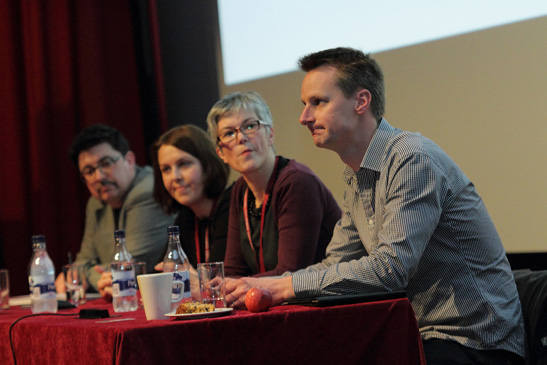On stage in Pictureville Cinema, Professor Paul Wells from the University of Loughborough is speaking to a room of student animators and film-makers on behalf of the Association of British Animation Collections. Established in 2010, the ABAC is dedicated to collecting bodies of student film for their archives, one that hopes to compile a series of work from around the country that attests to a national legacy of animation.
With him is Professor Chris Williams of Bournemouth University, Professor Caroline Parsons of Newport University, Tony Prosser of Realtime UK and Sophie Jenkins of VFX company Double Negative, and today they are discussing the role of student film in this plan as well as some of the crises that they see emerging in recent student productions.

style over substance?
Chris Williams begins with a collection of work encountered during his tenure at Teeside University: demonstrating the technical prowess that these works display, he concludes his presentation with an example of work that his students have gone on to do (which includes VFX work for recent Pixar hits Cars 2 and Brave).
Though Tony Prosser too highlights the technical skill that graduates in his company have displayed (which include pre-rendered promotional material for videogames such as Shogun 2: Total War and Kinect Sports), Caroline Parsons offers a different aspect of student film.
Showing a range of material that makes use of emotionally engaging narrative and varied animation styles (such as cel animation and stop motion), she argues that students are being taught style over substance and that they are losing the ability to tell stories and to create moving and thought-provoking films.
A commercial job market awaits
Sophie Jenkins offers inspiration for ways graduates can find employment in the animation business by showcasing the type of showreels that are most effective in finding a job, but this leads onto a discussion about one of the problems facing most student films and film-makers.
As Williams points out, students are increasingly expecting a return on their university investment and this all too often means a concentration on VFX and computer animation, the most expansive corner of the animation market.
Another problem facing recent student animation is the commercialisation of universities themselves and their need to pull in students who want to work in an ever expanding market, one which leads to the slapdash creation of courses that do not teach their students all there is to know about animation procedures.
One thing that the speakers can agree on is that the standard of student animation seems to be slipping and, while this may be a cynical and demoralising thing to say to a room of budding animators, they say it because they care.
The speakers urge each student to not spread their work too thin and to encourage them to focus on expanding their range of skills: as Williams states, student animation can only be truly original and innovative if they themselves know what they want to do and know how to go about doing it.
The ABAC is constantly on the lookout for new bodies of student work. If you are interested in finding out more or to submitting a showreel then visit the Animation Academy website or email Paul Wells: p.wells@lboro.ac.uk.
2 comments on “Are student films a good launchpad for a career in animation?”